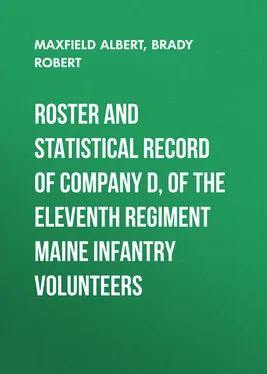Albert Maxfield - Roster and Statistical Record of Company D, of the Eleventh Regiment Maine Infantry Volunteers
Здесь есть возможность читать онлайн «Albert Maxfield - Roster and Statistical Record of Company D, of the Eleventh Regiment Maine Infantry Volunteers» — ознакомительный отрывок электронной книги совершенно бесплатно, а после прочтения отрывка купить полную версию. В некоторых случаях можно слушать аудио, скачать через торрент в формате fb2 и присутствует краткое содержание. Жанр: foreign_antique, foreign_prose, на английском языке. Описание произведения, (предисловие) а так же отзывы посетителей доступны на портале библиотеки ЛибКат.
- Название:Roster and Statistical Record of Company D, of the Eleventh Regiment Maine Infantry Volunteers
- Автор:
- Жанр:
- Год:неизвестен
- ISBN:нет данных
- Рейтинг книги:5 / 5. Голосов: 1
-
Избранное:Добавить в избранное
- Отзывы:
-
Ваша оценка:
- 100
- 1
- 2
- 3
- 4
- 5
Roster and Statistical Record of Company D, of the Eleventh Regiment Maine Infantry Volunteers: краткое содержание, описание и аннотация
Предлагаем к чтению аннотацию, описание, краткое содержание или предисловие (зависит от того, что написал сам автор книги «Roster and Statistical Record of Company D, of the Eleventh Regiment Maine Infantry Volunteers»). Если вы не нашли необходимую информацию о книге — напишите в комментариях, мы постараемся отыскать её.
Roster and Statistical Record of Company D, of the Eleventh Regiment Maine Infantry Volunteers — читать онлайн ознакомительный отрывок
Ниже представлен текст книги, разбитый по страницам. Система сохранения места последней прочитанной страницы, позволяет с удобством читать онлайн бесплатно книгу «Roster and Statistical Record of Company D, of the Eleventh Regiment Maine Infantry Volunteers», без необходимости каждый раз заново искать на чём Вы остановились. Поставьте закладку, и сможете в любой момент перейти на страницу, на которой закончили чтение.
Интервал:
Закладка:
With a well-manned battery, strongly supported, placed on the hill behind us, the Eleventh went down into the swamps of the Chickahominy, remaining there in a long skirmish line for two or three days, expecting every hour to hear the skirmishers of the enemy crashing through the woods of the opposite shore of the Chickahominy, now easily fordable by light troops. But before the momentarily uncertain enemy moved forward McClellan's rapidly laid plans had been fully acted on, our right wing was across the Chickahominy by its various bridges, the bridges were destroyed, and the retreat to the James River was in full operation. As we moved away from the Railroad Bridge, the center spans of which had been destroyed by axemen of the Eleventh the day before, the famous train of cars that our men had loaded with shells and combustibles at Savage Station came tearing down the track, and reaching the bridge took its mighty header.
General "Dick" Taylor, of the Confederates, who was in command of the troops at the other end of the bridge, says of it, while the battle of Savage Station was raging on the afternoon of June 29th, Magruder attacking Sumner, to be beaten off, the din of the distant combat was silenced to his ears by a train approaching from Savage Station, gathering speed as it rushed along, quickly emerging from the forest to show two engines drawing a long string of cars. Reaching the bridge, the engines exploded with a terrible noise, followed in succession by the explosion of the carriages laden with ammunition. Shells burst in all directions, he says, the river was lashed into foam, trees were torn for acres around, and several of his men were wounded.
To this harsh music we moved swiftly away till we had crossed White Oak Swamp Bridge in gathering darkness and reached the high ground beyond it. Here we bivouacked in line of battle, all but the guards sleeping on their arms, while the rear guard came filing across the bridge. In the morning exhausted troops could be seen lying fast asleep everywhere – in the fields, the woods, even in the dusty road itself. But all of our troops were across the swamp, and as fast as the packed condition of the roads to the James would permit, all but those of us to form the rear guard of the day, the divisions of Smith and Richardson and Naglee's Brigade, under command of Franklin, to lay here and hold Jackson himself at bay, were moving slowly towards the next selected position to make a stand – Malvern Hill. That Jackson was on the other side of the bridge we knew, the rattle of the skirmishers' rifles told us that. But just about noon he announced his presence by suddenly opening on us with thirty pieces of artillery.
One moment there was nothing above us but a cloudless summer sky, the next the air was full of shrieking shells, bursting in puffs of white smoke, and showering down a storm of broken iron. It was so startling in its suddenness that it is not strange, as the Second Corps chronicler says, that there was "a scene of dire confusion." And to add to it, the men in charge of a ponton train drawn up by the roadside, waiting for an opportunity to lumber away along it, unhitched their horses, mounted them and fled for the James River.
The confusion lasted but for a minute, and in it the Eleventh had no share. We were lying in the edge of the woods that bordered the great cleared field in which the troops and trains were massed, and perhaps had an advantage in all being wide awake. At any rate we were not a bit demoralized. Scarcely a man started to his feet, all waiting for the word of command. It came quickly, and from the mouth of General Naglee himself, who riding up to us and seeing our immovability while the troops around us were in evident confusion, could not restrain his delight at our coolness, but cried out "Fall in, my Yankee squad," for the Eleventh was few in numbers now. We fell in, and as he proudly led us across the big field to a new position, we stiffened our necks and neither dodged or bowed to the storm of iron beating down upon us. We had made a hit, and we knew it.
Taking up a position behind the rails of a torn-down fence, the Eleventh lay listening to Jackson's cannon and watching Hazzard's battery as it swept the White Oak Swamp Bridge with a storm of grape and cannister that kept even Jackson at bay. The cannoneers fell one by one – were thinned out until the officers not yet killed or wounded dismounted and took their places at the guns. It was whispered that their ammunition was giving out – was most gone – a few rounds more and the last shell would be fired, and then Jackson and his 35,000 men would pour across the bridge and up the heights to learn what sort of stuff we were made of.
But this was not to be. Just as we were gathering ourselves together for the apparently fast coming struggle, there came a yell from the rear, a sound of desperately galloping horses, and with slashing whips Pettits' battery came tearing on at the top of their horses' speed, General Naglee leading them into position. Ours, as did all the regiments massed in the big field, rose and cheered Naglee and the artillerymen as they swept by. Inside of a minute from their first appearance, they were in position, unlimbered, and were sweeping the bridge with grape and cannister.
Away on the left, at Glendale, there was fighting, and hard fighting too. Our men were so hard pressed that Franklin felt obliged to return two brigades to Sedgwick that he had borrowed from him. And our old commander, Colonel Caldwell, who had been with us during the day (now a Brigadier-General and commanding a brigade in Richardson's division), marched away with his brigade too, and rendered effective service in beating the masses of the enemy off.
They attacked at several points in their efforts to break through the lines of our men covering the roads by which our supply, ammunition and artillery trains were retreating to Malvern Hill. Slocum, on the Charles City road, was attacked at half-past one o'clock, but held his position by a sweeping artillery fire. Then, McCall, at Glendale, a point half way to Malvern Hill, was heavily attacked. McCall and many of his men and guns were captured, but the strength of the rebel blow was exhausted in the necessary effort, so that Sumner, whose line had been in the rear of McCall's, letting the broken troops through, opened heavily with artillery and musketry, repulsing all the enemy's efforts to break his line. Later in the day an attempt was made on Porter, stationed at Malvern Hill. He, too, by the aid of the gunboats, maintained his position. As night fell, we prepared to retreat. The abandoned ponton train was set on fire, and by its flaring light we moved back, marching on and on until morning found us in position with our own division at Malvern Hill.
The line of battle stretched around Malvern Hill, which is a point on the James River of perhaps sixty feet in height with a broad cleared top. Our line of defence made a huge semicircle, the flanks on the river and under protection of the gunboats. Our own position was on the right flank, close to the river. But a third of the troops of our army were actually engaged in the battle of July 1st, 1862. It was an artillery battle; the hill was crowned with sixty pieces of artillery, planted to sweep all possible openings by which troops could advance. Magruder and D. H. Hill made determined efforts to withstand their fire but, when supplemented with a rolling infantry fire, no troops could stand it. Night fell with our position undisturbed at any point.
As for me, I slept through most of the uproar; slept the sleep of the thoroughly tired-out. And I understand that all that could of the army did so too, refreshing tired Nature against the hour of need; many of the troops actually engaged waking to do their brief part in repelling an assault, and that done, to lie down in their line of battle to fall asleep again.
Читать дальшеИнтервал:
Закладка:
Похожие книги на «Roster and Statistical Record of Company D, of the Eleventh Regiment Maine Infantry Volunteers»
Представляем Вашему вниманию похожие книги на «Roster and Statistical Record of Company D, of the Eleventh Regiment Maine Infantry Volunteers» списком для выбора. Мы отобрали схожую по названию и смыслу литературу в надежде предоставить читателям больше вариантов отыскать новые, интересные, ещё непрочитанные произведения.
Обсуждение, отзывы о книге «Roster and Statistical Record of Company D, of the Eleventh Regiment Maine Infantry Volunteers» и просто собственные мнения читателей. Оставьте ваши комментарии, напишите, что Вы думаете о произведении, его смысле или главных героях. Укажите что конкретно понравилось, а что нет, и почему Вы так считаете.












